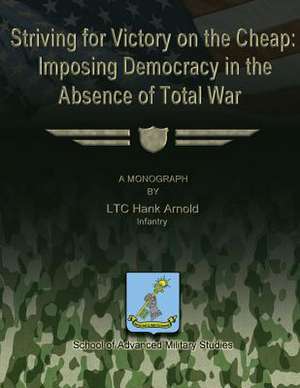Striving for Victory on the Cheap
Autor Infantry Ltc Hank Arnold Contribuţii de School Of Advanced Military Studiesen Limba Engleză Paperback
Preț: 108.55 lei
Nou
Puncte Express: 163
Preț estimativ în valută:
20.78€ • 22.58$ • 17.46£
20.78€ • 22.58$ • 17.46£
Carte disponibilă
Livrare economică 31 martie-14 aprilie
Preluare comenzi: 021 569.72.76
Specificații
ISBN-13: 9781481140577
ISBN-10: 1481140574
Pagini: 64
Dimensiuni: 216 x 279 x 3 mm
Greutate: 0.17 kg
Editura: CREATESPACE
ISBN-10: 1481140574
Pagini: 64
Dimensiuni: 216 x 279 x 3 mm
Greutate: 0.17 kg
Editura: CREATESPACE
